福州大学:《现代大学英语精读》课程PPT教学课件(精读A)book1 unit 3 Whatever happened to manners ?
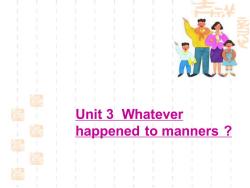
Unit 3 Whatever happened to manners
Unit 3 Whatever happened to manners ?
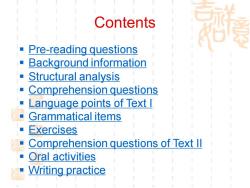
Contents Pre-reading questions Background information ■Structural analysis Comprehension questions Language points of Text I Grammatical items Exercises ■ Comprehension questions of Text ll Oral activities Writing practice
Contents ▪ Pre-reading questions ▪ Background information ▪ Structural analysis ▪ Comprehension questions ▪ Language points of Text I ▪ Grammatical items ▪ Exercises ▪ Comprehension questions of Text II ▪ Oral activities ▪ Writing practice
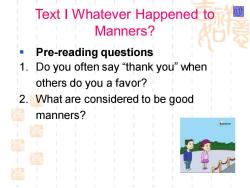
Text I Whatever Happened to Manners? Pre-reading questions 1.Do you often say "thank you"when others do you a favor? 2.What are considered to be good 阔 manners? 刷 超
Text I Whatever Happened to Manners? ▪ Pre-reading questions 1. Do you often say “thank you” when others do you a favor? 2. What are considered to be good manners?
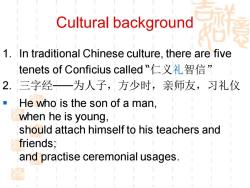
Cultural background 1.In traditional Chinese culture,there are five tenets of Conficius called"仁义礼智信” 2.三字经一为人子,方少时,亲师友,习礼仪 He who is the son of a man, when he is young, should attach himself to his teachers and friends; and practise ceremonial usages. 密
Cultural background 1. In traditional Chinese culture, there are five tenets of Conficius called “仁义礼智信” 2. 三字经——为人子,方少时,亲师友,习礼仪 ▪ He who is the son of a man, when he is young, should attach himself to his teachers and friends; and practise ceremonial usages

Table manners(1) 1)The Soup Course Dinner usually begins with soup.The largest spoon at your place is the soup spoon.It will be beside your plate at the right-hand side. ■2)The Fish Course -If there is a fish course,it will probably follow the soup.There may be a special fork for the fish,or it may be similar to the meat fork. Often it is smaller. 密
Table manners(1) ▪ 1) The Soup Course ▪ Dinner usually begins with soup. The largest spoon at your place is the soup spoon. It will be beside your plate at the right-hand side. ▪ 2) The Fish Course ▪ If there is a fish course, it will probably follow the soup. There may be a special fork for the fish, or it may be similar to the meat fork. Often it is smaller
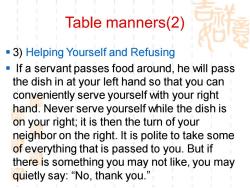
Table manners(2) -3)Helping Yourself and Refusing If a servant passes food around,he will pass the dish in at your left hand so that you can conveniently serve yourself with your right hand.Never serve yourself while the dish is on your right;it is then the turn of your neighbor on the right.It is polite to take some of everything that is passed to you.But if there is something you may not like,you may quietly say:“No,thank you
Table manners(2) ▪ 3) Helping Yourself and Refusing ▪ If a servant passes food around, he will pass the dish in at your left hand so that you can conveniently serve yourself with your right hand. Never serve yourself while the dish is on your right; it is then the turn of your neighbor on the right. It is polite to take some of everything that is passed to you. But if there is something you may not like, you may quietly say: “No, thank you
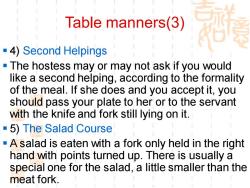
Table manners(3) 4)Second Helpings The hostess may or may not ask if you would like a second helping,according to the formality of the meal.If she does and you accept it,you should pass your plate to her or to the servant with the knife and fork still lying on it. -5)The Salad Course -A salad is eaten with a fork only held in the right hand with points turned up.There is usually a special one for the salad,a little smaller than the meat fork
Table manners(3) ▪ 4) Second Helpings ▪ The hostess may or may not ask if you would like a second helping, according to the formality of the meal. If she does and you accept it, you should pass your plate to her or to the servant with the knife and fork still lying on it. ▪ 5) The Salad Course ▪ A salad is eaten with a fork only held in the right hand with points turned up. There is usually a special one for the salad, a little smaller than the meat fork

Words and expressions 郎龍
Words and expressions
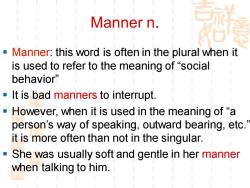
Manner n. Manner:this word is often in the plural when it is used to refer to the meaning of "social behavior" It is bad manners to interrupt. However,when it is used in the meaning of "a person's way of speaking,outward bearing,etc. it is more often than not in the singular. She was usually soft and gentle in her manner when talking to him
Manner n. ▪ Manner: this word is often in the plural when it is used to refer to the meaning of “social behavior” ▪ It is bad manners to interrupt. ▪ However, when it is used in the meaning of “a person’s way of speaking, outward bearing, etc.” it is more often than not in the singular. ▪ She was usually soft and gentle in her manner when talking to him

Get away v. (1)succeed in leaving The meeting dragged on,and I didn't get away until seven. (2)escape,esp.from the scene of a crime -The three men got away in a stolen car. (3)have to admit the truth of sth.unpleasant -I remember what a relief it was to get away from home. NB:get away with:to not be caught or punished when one has done sth.wrong
Get away v. ▪ (1) succeed in leaving ▪ The meeting dragged on, and I didn’t get away until seven. ▪ (2) escape, esp. from the scene of a crime ▪ The three men got away in a stolen car. ▪ (3) have to admit the truth of sth. unpleasant ▪ I remember what a relief it was to get away from home. ▪ NB: get away with: to not be caught or punished when one has done sth. wrong
按次数下载不扣除下载券;
注册用户24小时内重复下载只扣除一次;
顺序:VIP每日次数-->可用次数-->下载券;
- 福州大学:《现代大学英语精读》课程授课教案(三年级下)Lesson 9 The Bluest Eye.doc
- 福州大学:《现代大学英语精读》课程授课教案(三年级下)Lesson 8 A Rose for Emily.doc
- 福州大学:《现代大学英语精读》课程授课教案(三年级下)Lesson 7 Inaugural Address.doc
- 福州大学:《现代大学英语精读》课程授课教案(三年级下)Lesson 6 Death of a Pig.doc
- 福州大学:《现代大学英语精读》课程授课教案(三年级下)Lesson 5 The One Against the Many.doc
- 福州大学:《现代大学英语精读》课程授课教案(三年级下)Lesson 4 Nettles.doc
- 福州大学:《现代大学英语精读》课程授课教案(三年级下)Lesson 10 Notes on the English Character.doc
- 福州大学:《现代大学英语精读》课程授课教案(三年级下)Lesson 1 How to Get the Poor off Our Conscience.doc
- 福州大学:《现代大学英语精读》课程授课教案(三年级上)Lesson 7 Invisible Man.doc
- 福州大学:《现代大学英语精读》课程授课教案(三年级上)Lesson 9 The Way to Rainy Mountain.doc
- 福州大学:《现代大学英语精读》课程授课教案(三年级上)Lesson 6 Life Beyond Earth.doc
- 福州大学:《现代大学英语精读》课程授课教案(三年级上)Lesson 4 Professions for Women.doc
- 福州大学:《现代大学英语精读》课程授课教案(三年级上)Lesson 3 Goods move. People move. Ideas Move. And Cultures Change.doc
- 福州大学:《现代大学英语精读》课程授课教案(三年级上)Lesson 2 Two Kinds.doc
- 福州大学:《现代大学英语精读》课程授课教案(三年级上)Lesson 10 Before and After September 11.doc
- 福州大学:《现代大学英语精读》课程授课教案(三年级上)Lesson 1 Where Do We Go From Here?.doc
- 福州大学:《现代大学英语精读》课程授课教案(二年级下)Unit 9 The Peal.doc
- 福州大学:《现代大学英语精读》课程授课教案(二年级下)Unit 8 Antarctica.doc
- 福州大学:《现代大学英语精读》课程授课教案(二年级下)Unit 7 A Sunrise on the Veld.doc
- 福州大学:《现代大学英语精读》课程授课教案(二年级下)Unit 6 Predators, parasites and other Relationships.doc
- 福州大学:《现代大学英语精读》课程PPT教学课件(精读A)book1 Unit 5 How To Be True To Yourself.ppt
- 福州大学:《现代大学英语精读》课程PPT教学课件(精读A)book1 unit 7 When Lightning Struck.ppt
- 福州大学:《现代大学英语精读》课程PPT教学课件(精读A)book1 unit 8 My Forever Valentine.ppt
- 福州大学:《现代大学英语精读》课程PPT教学课件(精读A)book1 unit 1 Never Say Goodbye.ppt
- 福州大学:《现代大学英语精读》课程PPT教学课件(精读A)book1 unit 14 Five Traits of the Educated Man.ppt
- 福州大学:《现代大学英语精读》课程PPT教学课件(精读A)book1 Unit 2 The Fun They Had.ppt
- 福州大学:《现代大学英语精读》课程PPT教学课件(精读A)book1 Unit 4 Dealing with AIDS.ppt
- 福州大学:《现代大学英语精读》课程PPT教学课件(精读B)Unit 1 We have been hit.ppt
- 福州大学:《现代大学英语精读》课程PPT教学课件(精读B)Unit 10 The Jeaning of America.ppt
- 福州大学:《现代大学英语精读》课程PPT教学课件(精读B)Unit 11 Open the Door to Forgiveness.ppt
- 福州大学:《现代大学英语精读》课程PPT教学课件(精读B)Unit 14 The Wedding Story.ppt
- 福州大学:《现代大学英语精读》课程PPT教学课件(精读B)Unit 2 The Virtues of Growing Older.ppt
- 福州大学:《现代大学英语精读》课程PPT教学课件(精读B)Unit 3 My Stroke of Luck.ppt
- 福州大学:《现代大学英语精读》课程PPT教学课件(精读B)Unit 4 Cultural Encounters.ppt
- 福州大学:《现代大学英语精读》课程PPT教学课件(精读B)Unit 5 Fourteen Steps.ppt
- 福州大学:《现代大学英语精读》课程PPT教学课件(精读B)Unit 6 The Diary of the Unknown Soldier.ppt
- 福州大学:《现代大学英语精读》课程PPT教学课件(精读B)Unit 7 Letter to a B student.ppt
- 福州大学:《现代大学英语精读》课程PPT教学课件(精读B)Unit 9 What Is Happiness?.ppt
- 福州大学:《现代大学英语精读》课程PPT教学课件(精读C)Unit 1 Never Give In, Never, Never, Never.ppt
- 福州大学:《现代大学英语精读》课程PPT教学课件(精读C)Unit 10 How I Found My Voice.ppt
